Launched in September 2023, the Center’s name honors Professors Larry Gibson and Taunya Lovell Banks, who are the first Black man and woman to become tenured professors at Maryland Carey Law. Through the Gibson-Banks Center, the law school is committed to pursuing equity and improving the lives of racially marginalized individuals and communities through education and engagement, advocacy and research.
The Gibson-Banks Center uses several tools of transformation—education and engagement, advocacy, and research—to clarify and protect the legal rights of racially marginalized groups in a wide range of areas, including the criminal legal system, economic justice, employment, education, housing, health, technology, transportation, voting, and emerging issues.
What We Do
The Gibson-Banks Center hosts public lectures, conferences, and symposia focused on current and/or historical perspectives on race and the law. We also utilize different artistic forms—including film screenings, book talks, and other expressive forms—to extend and deepen both the understanding and urgency of addressing racial inequalities.
The Gibson-Banks Center’s advocacy work includes initiating or supporting litigation or administrative hearings in state and federal courts and agencies; authoring amicus (‘friend of the court’) briefs in cases of local, state, and national importance; and advancing policy and legislative change at the local, state, and federal levels.
The Gibson-Banks Center produces and promotes legal scholarship and multidisciplinary research focused on examining and addressing racial and intersectional inequalities and injustices.
Our Work
- December 13, 2024: The Gibson-Banks Center signed on to an amicus brief (People of the State of New York v. Dalen Joseph) filed in the Supreme Court of the State of New York Appellate Division urging the court to reverse the felony-murder conviction of Dalen Joseph, a Black teenager. In New York, the felony-murder doctrine provides that an unintentional death that occurs during the commission of certain felonies becomes second degree murder. The brief argues that the doctrine should not apply to Joseph because its application raises racial bias, due process, and unjust punishment concerns.
- December 9, 2024: The Center joined over 130 organizations in asking President Biden to commute the death sentences of the 40 individuals who are on federal death row. The letter acknowledges the Biden administration’s moratorium on executions for those sentenced to death, but urges that more needs to be done. (Death Row Commutation Letter)
- June 2024 – The Gibson-Banks Center signed on to an amicus brief filed in the U.S. Court of Appeals for the Fifth Circuit urging the Court to grant the petitioner’s Motion for Certificate of Appealability because defense counsel relied on racial stereotypes while arguing at sentencing that his own client, a Black man subsequently sentenced to death, was biologically predisposed toward violence because he is Black.
- May 23, 2024 – Professor Michael Pinard, Faculty Director, Gibson-Banks Center, addressed the National Association of Criminal Defense Lawyer’s Seminar, Race Matters: Addressing the Intersection of Race in the Criminal Legal System, in a presentation titled, Defending is Not Enough.
- February 2024
- The Gibson-Banks Center hosted a law school anchor event, featuring Professor Orisanmi Burton(American University, Department of Anthropology) discussing his book, Tip of the Spear: Black Radicalism, Prison Repression, and the Long Attica Revolt (University of California Press, 2023).
- The Gibson-Banks Center signed on to an amicus brief filed in the U.S. Court of Appeals for the Ninth Circuit arguing for recognition of intersectional race-and-gender groups, such as Black women, as a protected class under Batson v. Kentucky, a U.S. Supreme Court case that held unconstitutional the practice of using peremptory challenges to automatically exclude potential jurors because of their race.
- The Gibson-Banks Center’s student fellow, Brandon Miller, Erek L. Barron Fellow, submitted testimony in favor of Maryland House and Senate bills seeking to establish a Correctional Ombudsman Unit (subsequently passed and signed into law).
- The Center’s student fellow, Brandon Miller, Erek L. Barron Fellow, submitted written testimony in favor of Maryland House and Senate bills seeking to broaden investigatory authority of local police accountability boards.
- October 2023 – The Gibson-Banks Center announced as a member organization of the Maryland Equitable Justice Collaborative, a joint initiative between the Maryland Office of the Attorney General and the Maryland Office of the Public Defender focused on addressing mass incarceration rates of Black men and other marginalized groups in Maryland’s prisons and jails.
- December 13, 2024: The Gibson-Banks Center’s Faculty Director, Michael Pinard, submitted a letter commenting on the U.S. Department of Education’s Office for Civil Rights proposed Civil Rights Data Collection for the 2025-26 and 2027-28 school years. (Letter on proposed Civil Rights Data Collection)
- July 29, 2024: The Gibson-Banks Center’s Executive Director, Monique Dixon, provided remarks at the Brown at 70 and the Role of Magnet Schools in Promoting Integration Symposium of the Magnet Schools of America.
- January 2024 - Professor Michael Pinard (Faculty Director, Gibson-Banks Center), received the Michael A. Olivas Award for Outstanding Leadership in Diversity in the Legal Academy at the Association of American Law Schools Annual Meeting in recognition of his commitment to mentoring new and aspiring faculty from marginalized communities and promoting diversity, inclusion, and equity in the legal academy.
- November 17, 2023 – The Gibson-Banks Center cohosted a conference commemorating the release of the book, Race and National Security, edited by Matiangai Sirleaf, Nathan Patz Professor of Law at Maryland Carey Law.
Leadership
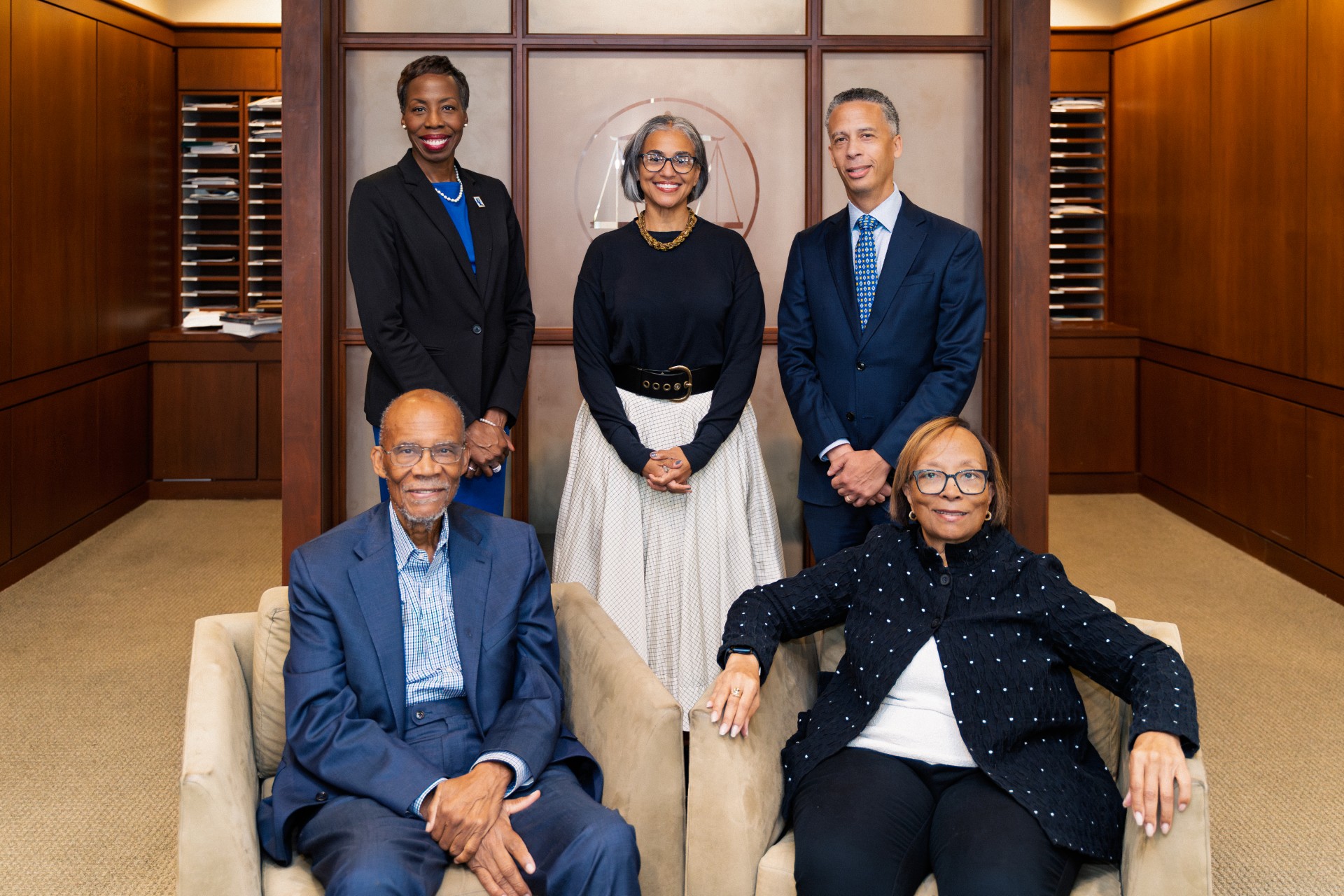
(Seated (left to right): Emeritus Professor Larry S. Gibson; Emeritus Professor Taunya Lovell Banks | Standing (left to right): Executive Director Monique Dixon ’96; Dean Renée Hutchins Laurent; Professor Michael Pinard)
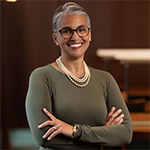 Renée Hutchins Laurent, the Dean of Maryland Carey Law, is a leading expert in the United States on the Fourth Amendment. Her scholarship has focused on various ways in which race intersects with the Fourth Amendment, including racial profiling and stop-and-frisk.
Renée Hutchins Laurent, the Dean of Maryland Carey Law, is a leading expert in the United States on the Fourth Amendment. Her scholarship has focused on various ways in which race intersects with the Fourth Amendment, including racial profiling and stop-and-frisk.
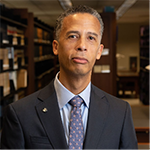 Michael Pinard, the Francis & Harriet Iglehart Professor of Law, The Honorable William H. Murphy Jr., Faculty Director,
Michael Pinard, the Francis & Harriet Iglehart Professor of Law, The Honorable William H. Murphy Jr., Faculty Director,
Gibson-Banks Center for Race & the Law, and Director, Clinical Law Program, is a national leader on issues related to race and the criminal legal system. He is the intellectual and visionary lead behind the law school’s efforts to create the Gibson-Banks Center.
 Larry Gibson, the Morton & Sophia Macht Professor of Law, taught his last class at the University of Maryland Francis King Carey School of Law in spring 2025. He is a legal historian who has written one of the definitive biographies of Thurgood Marshall and will soon release a second book about Justice Marshall. He taught seminars on Thurgood Marshall and race and the law. He has curated several exhibits on the history of Black lawyers in Maryland. In 1974, Gibson became the first Black man to become a tenured professor at Maryland Carey Law. He has indeed demonstrated strong leadership both within and outside of the law school.
Larry Gibson, the Morton & Sophia Macht Professor of Law, taught his last class at the University of Maryland Francis King Carey School of Law in spring 2025. He is a legal historian who has written one of the definitive biographies of Thurgood Marshall and will soon release a second book about Justice Marshall. He taught seminars on Thurgood Marshall and race and the law. He has curated several exhibits on the history of Black lawyers in Maryland. In 1974, Gibson became the first Black man to become a tenured professor at Maryland Carey Law. He has indeed demonstrated strong leadership both within and outside of the law school.
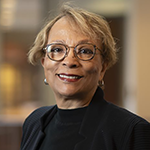 Taunya Lovell Banks, Jacob A. France Professor of Equality Jurisprudence, taught her final class at the University of Maryland Francis King Carey School of Law in fall 2021. The legendary critical race theory scholar and first tenured Black woman on the law school faculty retired after an illustrious career in which she trained her sharp scholarship on exposing systemic sexism and racism and inspired generations of students and colleagues to dedicate their legal careers to the fight for social justice.
Taunya Lovell Banks, Jacob A. France Professor of Equality Jurisprudence, taught her final class at the University of Maryland Francis King Carey School of Law in fall 2021. The legendary critical race theory scholar and first tenured Black woman on the law school faculty retired after an illustrious career in which she trained her sharp scholarship on exposing systemic sexism and racism and inspired generations of students and colleagues to dedicate their legal careers to the fight for social justice.
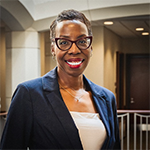 Monique L. Dixon, Executive Director, Gibson-Banks Center for Race and the Law, is responsible for managing the day-to-day operations of and strategic planning for the Gibson-Banks Center. She joined the Center after serving as the Deputy Assistant Secretary for Policy at the U.S. Department of Education’s Office for Civil Rights.
Monique L. Dixon, Executive Director, Gibson-Banks Center for Race and the Law, is responsible for managing the day-to-day operations of and strategic planning for the Gibson-Banks Center. She joined the Center after serving as the Deputy Assistant Secretary for Policy at the U.S. Department of Education’s Office for Civil Rights.
Staff
 Teresa Christian, Paralegal, provides legal services and programmatic support to the Center. Her interest focuses on health equity, which addresses the systemic barriers that create disparities in health outcomes for underserved populations. Common identified barriers include poverty, discrimination, lack of quality education and jobs, poor transportation, unsafe environments, and inadequate health insurance coverage and healthcare.
Teresa Christian, Paralegal, provides legal services and programmatic support to the Center. Her interest focuses on health equity, which addresses the systemic barriers that create disparities in health outcomes for underserved populations. Common identified barriers include poverty, discrimination, lack of quality education and jobs, poor transportation, unsafe environments, and inadequate health insurance coverage and healthcare.
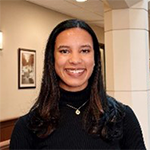 Erika Lewis, Erek L. Barron Student Fellow, is a third-year law student at Maryland Carey Law. She began her service at the Center during the spring 2025 semester as a student fellow. As an Erek L. Barron Student Fellow for the 2025-26 academic year, Lewis continues to perform policy and legal research, advocacy, and education and engagement activities for the Center. She also serves as the notes & comments editor of the Maryland Law Review and is a peer advisor and a member of the Black Law Students Association. She is a May 2026 Juris Doctor candidate.
Erika Lewis, Erek L. Barron Student Fellow, is a third-year law student at Maryland Carey Law. She began her service at the Center during the spring 2025 semester as a student fellow. As an Erek L. Barron Student Fellow for the 2025-26 academic year, Lewis continues to perform policy and legal research, advocacy, and education and engagement activities for the Center. She also serves as the notes & comments editor of the Maryland Law Review and is a peer advisor and a member of the Black Law Students Association. She is a May 2026 Juris Doctor candidate.
Kezia  McDonald-McNeal, Student Fellow, is a second-year law student at Maryland Carey Law. She joined the Center in January 2026, where she engages in policy and legal research, advocacy, and education initiatives. McDonald-McNeal also serves as a Peer Advisor and holds leadership roles in several student organizations, including vice president of Students Supporting the Women’s Law Center and special projects co-chair of Baltimore Outreach for Student Success. She is a May 2027 Juris Doctor candidate.
McDonald-McNeal, Student Fellow, is a second-year law student at Maryland Carey Law. She joined the Center in January 2026, where she engages in policy and legal research, advocacy, and education initiatives. McDonald-McNeal also serves as a Peer Advisor and holds leadership roles in several student organizations, including vice president of Students Supporting the Women’s Law Center and special projects co-chair of Baltimore Outreach for Student Success. She is a May 2027 Juris Doctor candidate.
 Rashad Hawkins, Community Fellow, joined the Center in January 2025. He coordinates the Youth Justice Project. Hawkins conducts community outreach to young adults who have had contact with the youth or adult criminal legal system to build awareness, interest, and participation in the project. Hawkins is a community organizer and founder of BMore Awesome Inc.
Rashad Hawkins, Community Fellow, joined the Center in January 2025. He coordinates the Youth Justice Project. Hawkins conducts community outreach to young adults who have had contact with the youth or adult criminal legal system to build awareness, interest, and participation in the project. Hawkins is a community organizer and founder of BMore Awesome Inc.
Affiliated Faculty
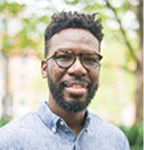 Chaz Arnett, Jacob A. France Professor of Law
Chaz Arnett, Jacob A. France Professor of Law
 Leigh Goodmark, Associate Dean for Research and Faculty Development and Marjorie Cook Professor of Law
Leigh Goodmark, Associate Dean for Research and Faculty Development and Marjorie Cook Professor of Law
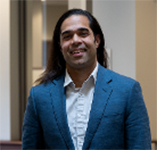 Guha Krishnamurthi, Professor of Law
Guha Krishnamurthi, Professor of Law
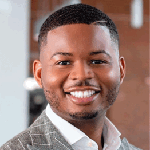 Christopher Mathis, Assistant Professor of Law
Christopher Mathis, Assistant Professor of Law
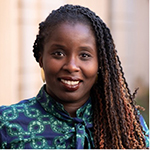 Matiangai Sirleaf, Nathan Patz Professor of Law
Matiangai Sirleaf, Nathan Patz Professor of Law
 Omavi Shukur, Assistant Professor of Law
Omavi Shukur, Assistant Professor of Law
 Tiffany Yang, Assistant Professor of Law
Tiffany Yang, Assistant Professor of Law
